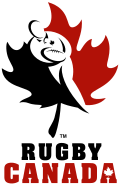 | |
| Sport | Rugby union |
|---|---|
| Founded | 1974 |
| World Rugby affiliation | 1987 |
| RAN affiliation | 2001 |
| Chairman | Kathleen McGinn |
| Men's coach | Steve Meehan |
| Women's coach | Kévin Rouet |
| Website | www |
Rugby Canada is the national governing body for the sport of rugby union in Canada. Rugby Canada was incorporated in 1974, and stems from the Canadian Rugby Football Union, a body established in 1884 that now governs amateur Canadian football as Football Canada; and the now-defunct Rugby Union of Canada, established in 1929. Rugby Canada administers the Canada national rugby union team and sanctions the Rugby Canada National Junior Championship, a national competition for under-20 men's teams. It previously sanctioned the Super League as the premier level of men's competition in the country, but scrapped that league after the Americas Rugby Championship was created in 2009 as a two-stage competition in which the first involved only Canadian teams.
